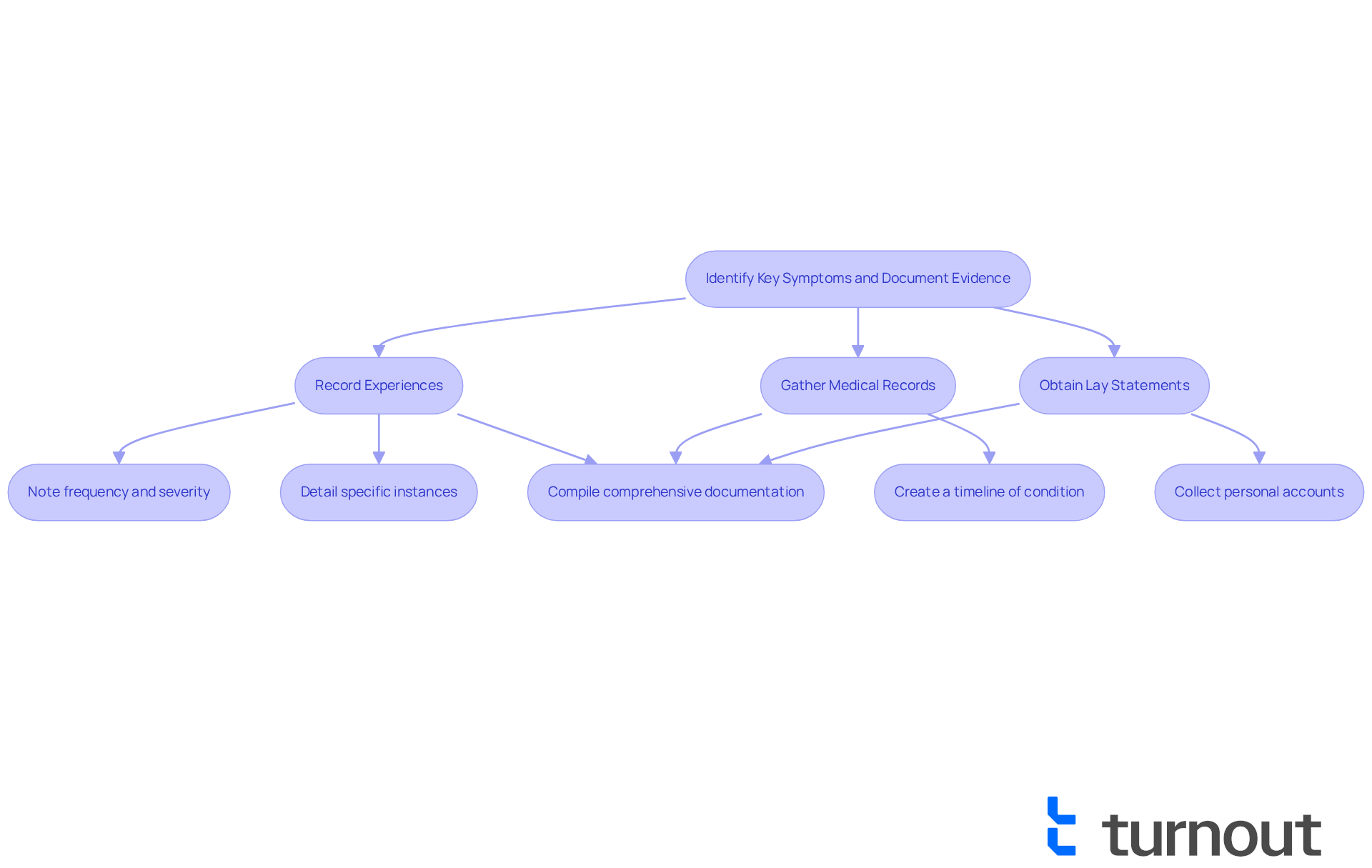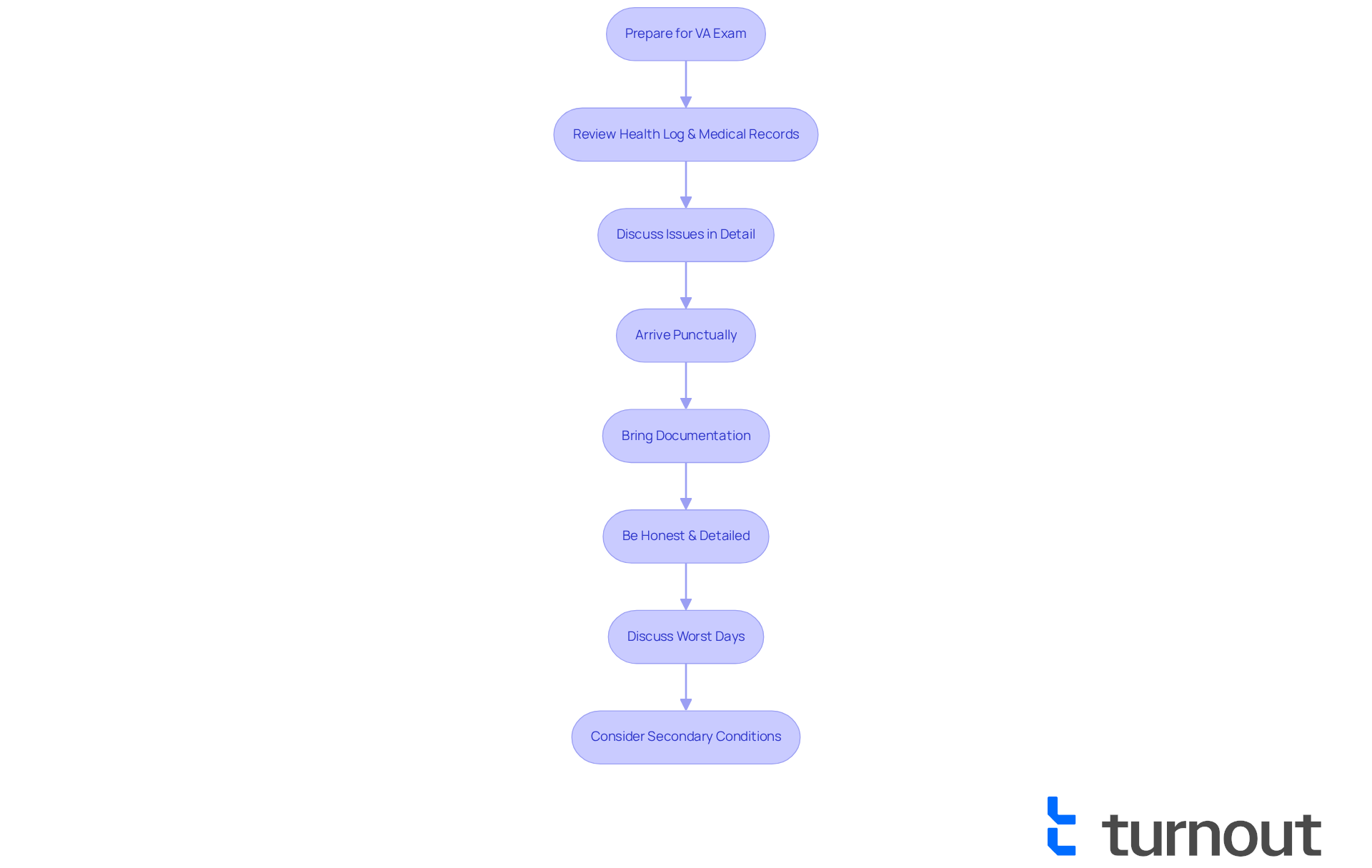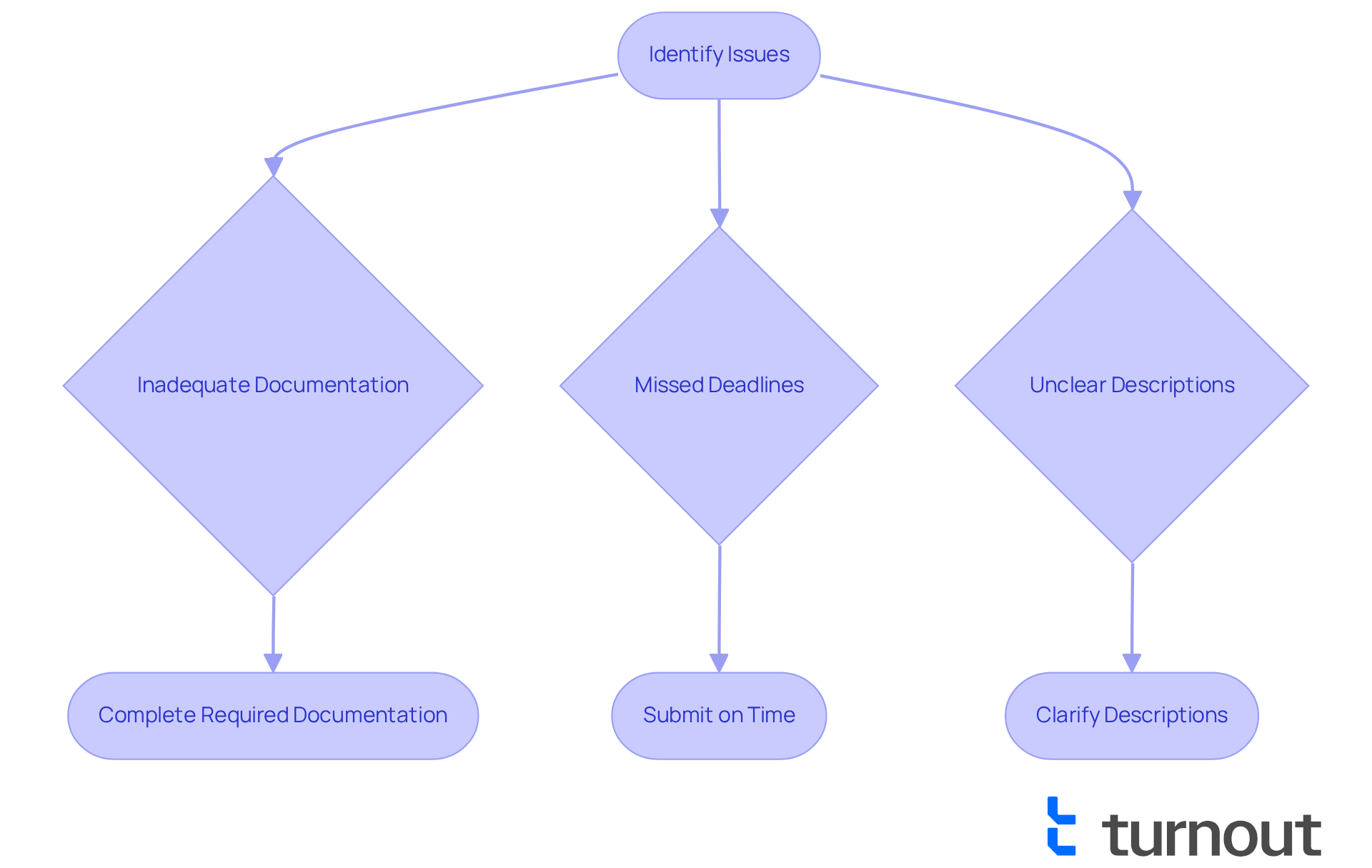Overview
Navigating the VA rating process for Irritable Bowel Syndrome (IBS) can be challenging, and we understand how overwhelming it may feel. This article offers a comprehensive step-by-step guide designed to support you through this journey. By emphasizing the importance of thorough documentation and understanding the rating criteria, we aim to empower you.
The guide outlines specific symptoms and severity levels that impact your rating, providing clear insights into what you may encounter. Alongside this, we share practical tips for preparing for the VA exam, addressing common challenges that veterans often face in the claims process. Remember, you are not alone in this journey; we are here to help.
As you read through, reflect on your experiences and consider how these insights can assist you. Together, we can navigate this process with confidence and clarity.
Introduction
Navigating the intricacies of the VA rating for Irritable Bowel Syndrome (IBS) can feel overwhelming for veterans seeking the benefits they truly deserve. We understand that this journey is filled with challenges, and it's essential to grasp the evaluation criteria while effectively documenting your symptoms. This documentation plays a crucial role in influencing the rating outcome.
However, with the introduction of new guidelines and a structured approach, you can significantly enhance your chances of achieving a favorable rating. What strategies can you employ to overcome common obstacles and ensure your claims are not only submitted but also successful? We're here to help you through this process.
Understand the VA Rating Criteria for IBS
Navigating the complexities of Irritable Bowel Syndrome (IBS) can be challenging, and we understand that. The is determined by assessing the severity using Diagnostic Code 7319, which assigns percentages of 0%, 10%, 20%, or 30% based on the intensity and frequency of symptoms. For severe cases characterized by near-constant abdominal discomfort, a 30% classification is given. In contrast, a 10% classification pertains to mild issues. Understanding the is crucial for veterans as it helps them determine eligibility and organize requests efficiently.
Key criteria include documented symptoms like severe abdominal pain, daily nausea, and alternating constipation and diarrhea. Many veterans who have successfully emphasize the , as this can significantly influence the VA rating for IBS. The aim to provide a clearer assessment of IBS, ensuring that veterans receive the based on the severity of their condition.
Additionally, we encourage veterans to transition from DS Logon to a Login.gov or ID.me account by September 30. This change will without interruption. If you have previously faced challenges with a 10% evaluation, the new standards may help improve your VA rating for IBS and lead to a more favorable outcome. Importantly, the establishment of a 20% assessment for for a 30% evaluation is a significant step for those managing their applications.
As Under Secretary for Benefits Josh Jacobs stated, these updates are designed to align the rating criteria with the goal of providing evaluations based on average impairment of earning capacity. Remember, you are not alone in this journey, and we are here to help you every step of the way.

Identify Key Symptoms and Document Evidence
To enhance your , we understand that the process can feel overwhelming at first. Begin by carefully recording your experiences. Note the frequency, duration, and severity of your episodes, detailing specific instances of abdominal pain, diarrhea, or constipation, and how they affect your daily life. This health diary is essential, as it provides a clear perspective on how IBS impacts your functioning and well-being. Accurate representation of your experiences is crucial; misrepresenting emotional distress may lead to a lack of credibility in your testimony.
Along with your health log, that detail your diagnosis and treatment history. These records are vital, as they create a timeline of your condition and bolster the credibility of your assertion. Recording these indicators can significantly influence the [VA rating for IBS](https://blog.turnout.co/10-key-insights-on-own-occupation-disability-insurance), which affects both endorsement and disability assessment. Furthermore, consider obtaining statements from family or friends who can share personal accounts of how your IBS symptoms impact your daily activities. Such to your assertion, reinforcing the evidence presented and enhancing its credibility, as highlighted in the case study on Lay Statements and Witness Accounts.
This comprehensive documentation will serve as , greatly affecting the decision-making process. Veterans who have successfully navigated the claims process often emphasize the . They point out that a precise depiction of their situations can lead to positive outcomes. By maintaining thorough records and gathering supportive documentation, you are enhancing your chances of receiving the benefits you deserve. However, be cautious; exaggerating limitations in daily activities could lead to a denial based on inconsistencies in evidence. Remember, you are not alone in this journey, and we’re here to help you every step of the way.

Prepare for Your VA Exam: Tips and Strategies
To effectively prepare for your VA exam, we understand that reviewing your health log and medical records can feel overwhelming. Begin by thoroughly going through these documents. Be ready to discuss your issues in detail, including their frequency and intensity. It's essential to articulate how IBS impacts your daily life, especially in relation to the and any limitations it imposes. Personal statements detailing the can reinforce your VA rating for IBS.
Arriving punctually for the exam and bringing all pertinent documentation, such as your health log and medical records, is crucial. Integrity and are vital; overstating or minimizing issues can negatively affect your evaluation. Many veterans have found success by , providing a clearer picture of their condition. For instance, one veteran shared that detailing the frequency of abdominal pain and its impact on daily activities helped illustrate the severity of their IBS during the exam. Another highlighted the significance of , strengthening their arguments.
It's common to feel anxious about the exam process, but steering clear of typical mistakes can make a difference. Remember to include the VA rating for IBS along with secondary conditions associated with IBS, as this can improve your overall evaluation. The goal is to present a to ensure you receive the benefits you deserve. Notably, IBS affects approximately 14% of Gulf War veterans, highlighting its prevalence among veterans. Furthermore, veterans should recognize the possibility of , which is an essential element of the application process for the VA rating for IBS via direct or secondary service connection. We're here to help you navigate this journey together.

Troubleshoot Common Issues in the VA Rating Process
Navigating the procedure can be challenging, as frequent obstacles often stem from inadequate documentation, missed deadlines, and unclear descriptions of issues. We understand that these challenges can be frustrating, but there are steps you can take to address them. Ensure that all required documentation is complete and submitted promptly. Statistics reveal that nearly a third of veterans face , often due to these very pitfalls, as noted by the .
If your request is denied, take a moment to carefully review the reasons behind the denial. Gathering additional evidence to address any concerns raised by the VA can make a significant difference. For example, veterans who successfully appealed their requests often provided comprehensive medical records and personal statements that clarified their symptoms and their impact on daily life.
Engaging with knowledgeable advocates can also be incredibly beneficial. They can help clarify the process and offer guidance on . As the Department of Veterans Affairs states, ", but you don’t have to go through the process alone." Maintaining organization and initiative during this journey can greatly improve your chances of achieving a positive result.
Remember, timely submission is crucial. The VA emphasizes that "if you submit your claim late, there’s a higher chance of denial, even if the claim is valid." By being thorough and attentive to detail, you can navigate the complexities of the VA rating for IBS process more effectively. You're not alone in this journey, and with the right support, you can overcome these hurdles.

Conclusion
Navigating the VA rating for Irritable Bowel Syndrome (IBS) can feel overwhelming. We understand that the complexities of this journey may leave you feeling uncertain. However, by grasping the criteria and preparing thoroughly, you can significantly enhance your chances of a favorable outcome. This guide emphasizes the importance of recognizing the severity of your symptoms, maintaining detailed documentation, and preparing effectively for the VA exam. By understanding these elements, you can advocate for yourself and ensure you receive the support you truly deserve.
Key insights include:
- The necessity of accurately documenting your symptoms
- The impact of personal statements
- The importance of submitting claims in a timely manner
We encourage you to:
- Gather your medical records
- Maintain a health diary
- Seek support from knowledgeable advocates
These steps can help you navigate potential obstacles in the VA rating process and can make a substantial difference in the evaluation of your claims.
Ultimately, remember that the journey toward securing a VA rating for IBS is one you do not have to face alone. With the right preparation, documentation, and support, this process can lead to the recognition and benefits that reflect the true impact of IBS on your daily life. By taking proactive steps today, you can pave the way for a more favorable evaluation and ensure that you receive the care and assistance you need and deserve.
Frequently Asked Questions
How is the VA rating for Irritable Bowel Syndrome (IBS) determined?
The VA rating for IBS is determined using Diagnostic Code 7319, which assigns percentages of 0%, 10%, 20%, or 30% based on the severity and frequency of symptoms.
What does a 30% classification for IBS indicate?
A 30% classification is given for severe cases characterized by near-constant abdominal discomfort.
What does a 10% classification for IBS indicate?
A 10% classification pertains to mild issues related to IBS.
What key symptoms are considered for the VA rating of IBS?
Key symptoms include severe abdominal pain, daily nausea, and alternating constipation and diarrhea.
Why is it important for veterans to maintain thorough records of their IBS symptoms?
Maintaining thorough records of symptoms can significantly influence the VA rating for IBS and help veterans navigate the application process more effectively.
What changes to the evaluation criteria for IBS were introduced in 2024?
The new evaluation criteria aim to provide a clearer assessment of IBS, ensuring veterans receive appropriate recognition and support based on the severity of their condition.
What is the significance of transitioning from DS Logon to Login.gov or ID.me accounts?
Transitioning to Login.gov or ID.me accounts by September 30 will help veterans manage their VA benefits online without interruption.
How might the new standards affect veterans with a previous 10% evaluation?
The new standards may help improve their VA rating for IBS and lead to a more favorable outcome.
What is the purpose of establishing a 20% assessment for veterans?
The establishment of a 20% assessment is significant for veterans who could not meet the previous criteria for a 30% evaluation, providing them with a better chance of a favorable rating.
What is the overarching goal of the updated rating criteria?
The updates aim to align the rating criteria with the goal of providing evaluations based on the average impairment of earning capacity.




